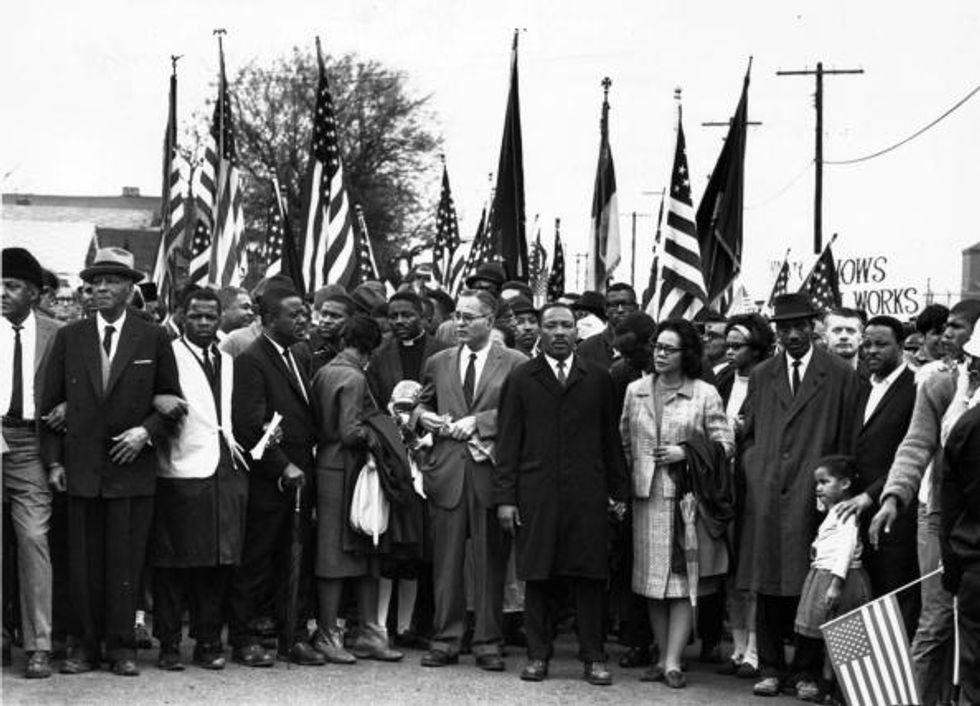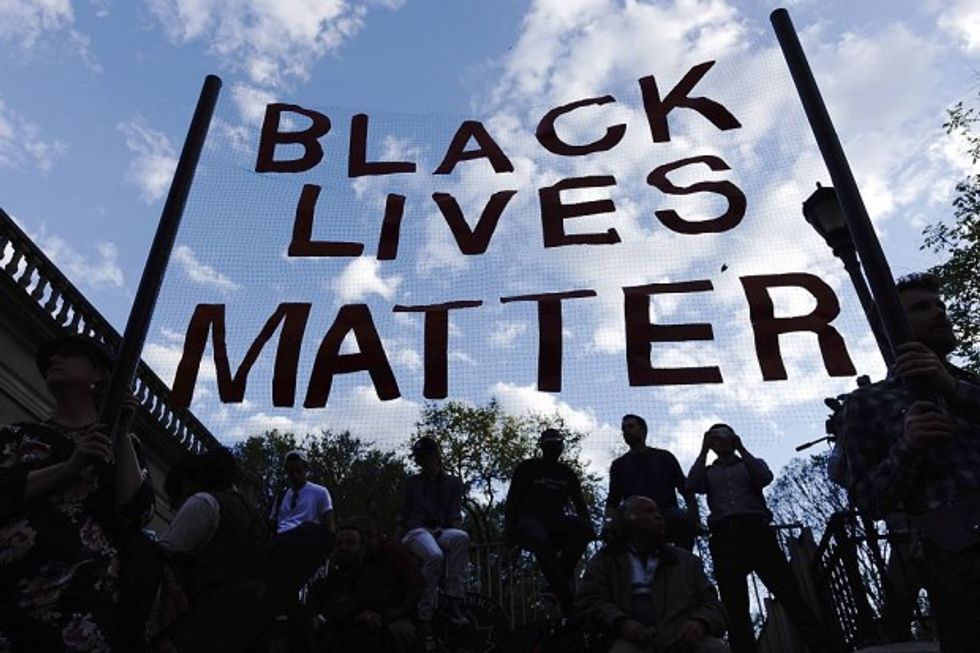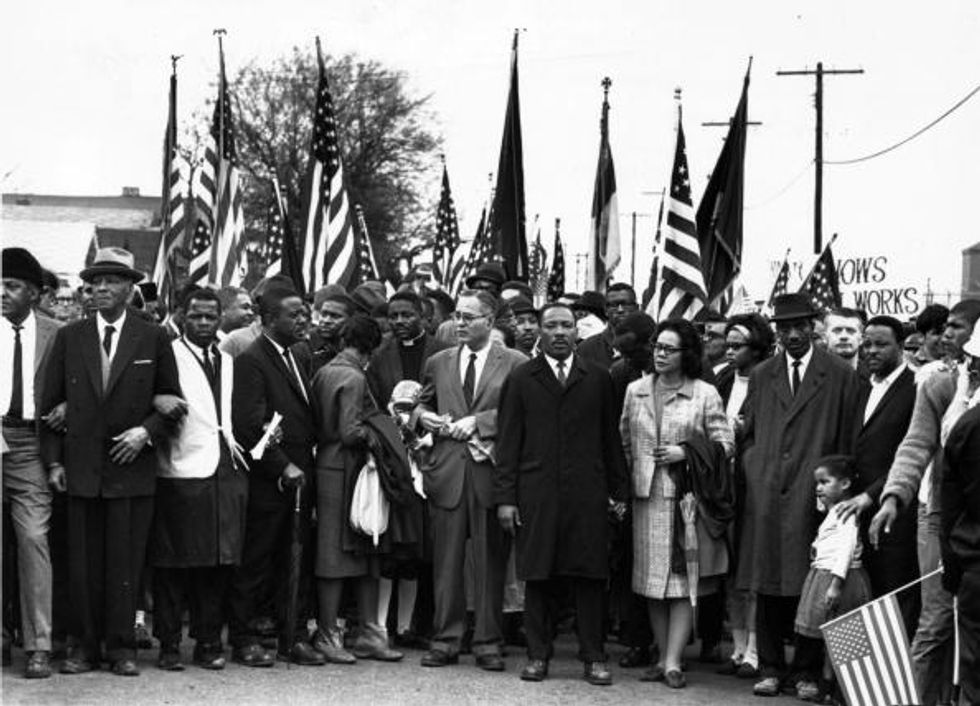
Civil rights campaigner Dr Martin Luther King (1929 - 1968) with his wife Coretta Scott King, at a black voting rights march from Selma, Alabama, to the state capital in Montgomery. (Photo by William Lovelace/Express/Getty Images)

Blunt accusations of racism have become a common feature of public discourse over the past few years. With this, the views of both whites and blacks about the state of race relations in America have sunk to the lowest levels they have ever been since Gallup began polling on this issue in 2001.
Beyond claims that specific individuals are “racist,” certain media outlets, activists, and politicians have leveled this charge at broad groups of Americans. For example:
Such claims frequently conflict with documented facts about race and violence, the use of lethal force by police, and the nature of racial income disparities. Hence, false allegations of racism can often be thoughtfully dismissed by rational and informed people.
However, one of the broadest, most persistent, and hardest-to-measure allegations of racism is directed at more than 65 million white Americans who live in the South. For more than 40 years, various scholars, commentators, and journalists have proclaimed that white Southerners are more likely to vote for Republicans than Democrats, because white Southerners are racist, and Republicans appeal to their racism.

As the common story goes, when the national Democratic Party embraced civil rights in the 1960s, white Southern racists began switching to the Republican Party, which is why the South mainly votes for Republicans today. This supposedly took place after a hundred-year period (from 1865 to 1965) during which:
Nevertheless, after a century of Republicans fighting for civil rights, certain prominent individuals like Princeton University professor Sean Wilentz claim that Republicans abruptly made a U-turn in the 1960s. These arguments are typically based on cherry-picked anecdotes that fall apart when examining the big picture.
For example, Wilentz singles out Strom Thurmond, a leading Democrat segregationist who became a Republican in the 1960s. Wilentz claims that “segregationist Southern Democrats (led by Strom Thurmond)” went “fleeing into the Republican Party” after 1964. Likewise, a commentary by Jordan Michael Smith states that “Thurmond and his compatriots moved to the Republican Party” when Democrats began supporting civil rights. And a Bloomberg editorial by Francis Wilkinson asserts that “approximately 100 percent of racist Southern Democrats switched parties to become Republicans between 1960 and 1980.”
The public records of elected officials prove those claims to be categorically false. Among the 21 Democratic Senators who voted against the Civil Rights Act of 1964, only Thurmond joined the Republican Party. The other 20 remained in the Democratic Party for their entire congressional careers.
Likewise, some of the nation’s most infamous segregationists were lifelong Democrats. This includes (but is not limited to) George Wallace, Bull Connor, Lester Maddox, and Orval Faubus. In the case of all of these individuals, certain politicians and media outlets have buried the fact that they were Democrats and even mislabeled them as Republicans.
Blatant untruths about public figures can be readily exposed, but accusations of racism towards millions of everyday people who live in the South are another story. There is no shortage of polling data to address how people feel about racial issues, but very few of these polls measure racism.

For instance, the editor-in-chief of ThinkProgress misuses a poll question about race and violence to pin the “racist” label on people who think that blacks are more violent than whites. Such poll questions don’t measure racism but perceptions of crime. In fact, black people in the U.S. are about seven times more likely than white people to commit murder. Recognizing this reality does not make one a racist.
Similarly, when a black Harvard professor and a white University of Chicago professor write that “blacks systematically score worse than whites” on “tests of intelligence,” they are not being racist. They are pointing out a serious problem likely caused by “environmental factors” that they want to solve.
In a 2015 draft paper, Princeton professor Ilyana Kuziemko and Yale professor Ebonya Washington took a unique approach to the issue of measuring racism among Southern whites. They focused on polling data from a question that Gallup has been asking Americans since 1958: “If your party nominated a generally well-qualified person for president who happened to be black, would you vote for him?”
These Ivy League professors acquired this data and ran it through several equations along with other data showing a 20 percentage-point drop in support for Democrats among Southern whites between 1958 and 2000. Based on their methodology, they concluded that 75 percent of this decline in support for Democrats was due to the racist attitudes of Southern whites.
Amid concerns about the way the study was conducted, Just Facts requested the raw data from the professors, and they did not reply. Just Facts was able to obtain the start and endpoints of this Gallup data from another source, and it shows that between 1958 and 1999, the portion of white Southerners willing to vote for a black president increased from 8 percent to 95 percent.
As explained by Gallup, 95 percent is “essentially universal willingness to state to an interviewer that the race of a candidate for president would make no difference.” In fact, the portion of non-white voters willing to vote for a black president are essentially the same—92 percent in 1999, 98 percent in 2012, and 93 percent in 2015. These figures are all within the polls’ margins of error.
In other words, Southern whites abandoned the Democratic Party as Southern whites became virtually non-racist according to this key measure. This fact is in direct conflict with those who accuse Southern whites of racism for leaving the Democratic Party.
Some of the many factors that may have actually played a role in Democratic Party losses in the South over past decades include but are not limited to:
Whatever the causes may be, claims that broadly paint modern white Southerners as racists are based on half-truths and outright falsehoods. The facts show just the opposite, and those who spread these false accusations are slandering millions of Americans who live in the South.
James D. Agresti is the president of Just Facts, a nonprofit institute dedicated to researching and publishing verifiable facts about public policy.
–
TheBlaze contributor channel supports an open discourse on a range of views. The opinions expressed in this channel are solely those of each individual author.